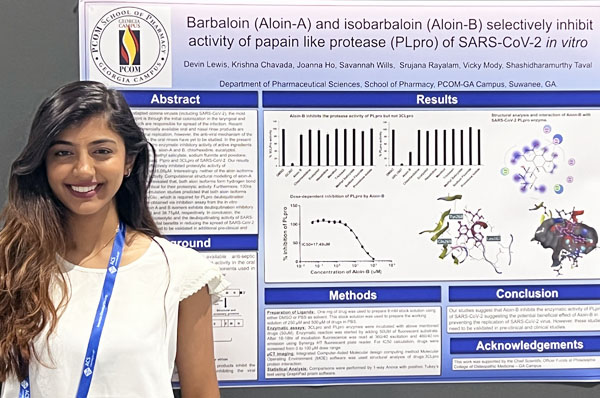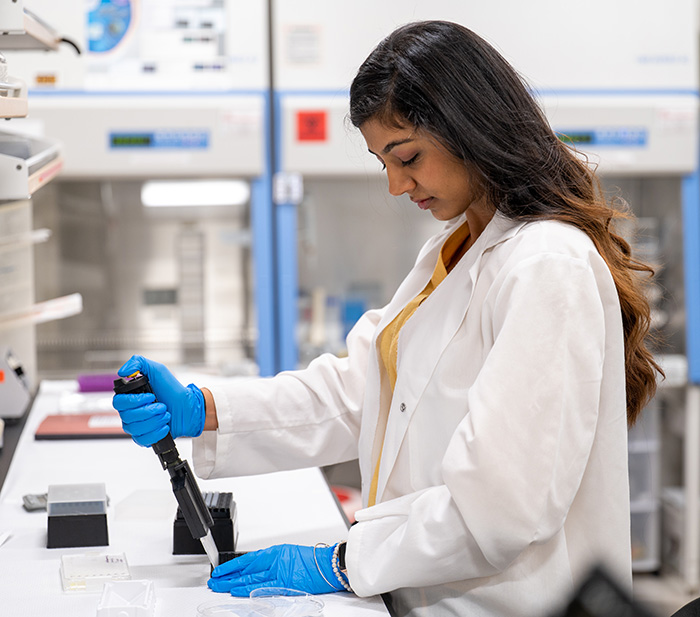Working to Affect the Viral Replication of COVID-19
Student Research Spotlight
October 4, 2023Krishna Chavada (PharmD '24), a native of India, moved with her family to Hahira,
a small town in South Georgia near Valdosta, when she was very young. She lived there
for about 13 years before relocating to Athens, Georgia, where she completed a Bachelor
of Science degree in psychology at the University of Georgia. Ever since taking an
AP psychology class in high school, she has been intrigued by the subject and knew
that she wanted to pursue that as her major.
Chavada said, “I knew health care was the path for me since I had seen my grandmother
deal with chronic bladder disease for as long as I could remember. I chose to become
a pharmacist so I could have a positive impact on patient lives and it has been so
rewarding.”
As a fourth year Doctor of Pharmacy (PharmD) student currently on rotation, she has applied her clinical knowledge to various
fields of pharmacy, ranging from ambulatory care to working at the Food and Drug Administration
to assisting on cancer drug approvals.
She said, “Being in pharmacy school has taught me that there are no limitations. The
world of pharmacy and health care is growing and expanding and there are so many opportunities
to share our knowledge and passion.”
What prompted you to pursue research?
When I first interviewed for the PCOM Georgia School of Pharmacy, I remember asking what research opportunities would be available to me and essentially
that is what drew me to come here. I wanted to make an impact by contributing in a
developing field with research. Working alongside Drs. Rayalam, Mody, and Taval has
been the most impactful part of my pharmacy school journey. These three professors
believed in me and guided me through a journey that has changed my life.
People think that research is just tedious, never-ending work; however, research is
rewarding to me. I originally felt like I didn't have the skillset to be a researcher.
My mentors have taught me that it's all about your mindset and I truly encourage students
to seek out mentors that are willing to guide them. The opportunities are endless
and all it takes is challenging oneself to step up to have the courage to ask. Research
served as a source of exposure that sparked my curiosity and deepened my desire for
knowledge.
In lay terms, what are you studying?
My team and I studied FDA-approved drugs to establish which ones could be repurposed
to inhibit the enzymes 3CLpro and PLpro, the enzymes that affect the viral replication
of COVID-19. We screened more than 4,000 drugs and I was trained to perform experiments
using modern technology. I was given the opportunity to present my research at the
American Chemical Society conference both in San Diego, California (Spring 2022) and
San Juan, Puerto Rico (Fall 2022). I presented my research on how I screened for the
inhibitory effect of Anthraquinone derivatives against SARS-CoV-2 enzymes.
What were your responsibilities in the research project?
Initially, I was responsible for conducting an appropriate literature review for this
project to have a greater understanding of the project's background. After doing so,
I screened through a multitude of FDA-approved drugs to narrow down our search and
used our previous findings that both Aloin A and B were found to selectively inhibit
SARS-CoV-2 PLpro enzyme. Aloin A and B both are naturally occurring Anthraquinone
derivatives hence, we evaluated in vitro enzymatic inhibitory activity of selected
26 Anthraquinones.
What prompted you to pursue research?
With an abundant number of lives remaining at risk of becoming severely ill from COVID-19,
it is urgent to find a safe remedy to control the global pandemic spread. Our studies
give proposal to the beneficial effect of Anthraquinones in the prevention of SARS-CoV-2,
however these studies require further validation in pre-clinical and clinical studies.
About PCOM Georgia
PCOM Georgia has been serving students and the community for 20 years as a branch campus of Philadelphia
College of Osteopathic Medicine (PCOM), a private, not-for-profit, accredited institution
of higher education established in 1899. Located in Suwanee (Gwinnett County), PCOM
Georgia offers doctoral degrees in osteopathic medicine, pharmacy and physical therapy.
Graduate degrees are offered in biomedical sciences, medical laboratory science and
physician assistant studies. The campus joins PCOM South Georgia in Moultrie in helping
to meet the healthcare needs of the state. Emphasizing "a whole person" approach to
care, PCOM Georgia focuses on educational excellence, interprofessional education
and service to the community. For more information, visit pcom.edu or call 678-225-7500. The campus is also home to the Georgia Osteopathic Care Center,
an osteopathic manipulative medicine clinic, which is open to the public by appointment.
For more information, visit pcomgeorgiahealth.org.
Contact Us
For general media inquiries, please contact the Office of Marketing and Communications
at 215-871-6300 or communications@pcom.edu. Visit our media relations page to view contact information for public relations personnel.
Connect with PCOM Georgia

 Krishna Chavada (PharmD '24), a native of India, moved with her family to Hahira,
a small town in South Georgia near Valdosta, when she was very young. She lived there
for about 13 years before relocating to Athens, Georgia, where she completed a Bachelor
of Science degree in psychology at the University of Georgia. Ever since taking an
AP psychology class in high school, she has been intrigued by the subject and knew
that she wanted to pursue that as her major.
Krishna Chavada (PharmD '24), a native of India, moved with her family to Hahira,
a small town in South Georgia near Valdosta, when she was very young. She lived there
for about 13 years before relocating to Athens, Georgia, where she completed a Bachelor
of Science degree in psychology at the University of Georgia. Ever since taking an
AP psychology class in high school, she has been intrigued by the subject and knew
that she wanted to pursue that as her major. In lay terms, what are you studying?
In lay terms, what are you studying?